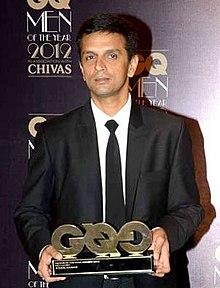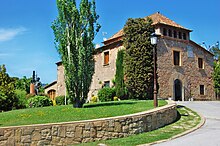Rahul Dravid

Rahul Dravid at GQ Men of the Year 2012 Awards
| ||||||||||||||||||||||||||||||||||||||||||||||||||||||||||||||||||
| Personal information | ||||||||||||||||||||||||||||||||||||||||||||||||||||||||||||||||||
|---|---|---|---|---|---|---|---|---|---|---|---|---|---|---|---|---|---|---|---|---|---|---|---|---|---|---|---|---|---|---|---|---|---|---|---|---|---|---|---|---|---|---|---|---|---|---|---|---|---|---|---|---|---|---|---|---|---|---|---|---|---|---|---|---|---|---|
| Full name | Rahul Sharad Dravid | |||||||||||||||||||||||||||||||||||||||||||||||||||||||||||||||||
| Born | 11 January 1973 Indore, Madhya Pradesh, India | |||||||||||||||||||||||||||||||||||||||||||||||||||||||||||||||||
| Nickname | The Wall, Jammy, Mr. Dependable | |||||||||||||||||||||||||||||||||||||||||||||||||||||||||||||||||
| Height | 5 ft 11 in (1.80 m) | |||||||||||||||||||||||||||||||||||||||||||||||||||||||||||||||||
| Batting style | Right-handed | |||||||||||||||||||||||||||||||||||||||||||||||||||||||||||||||||
| Bowling style | Right arm off spin | |||||||||||||||||||||||||||||||||||||||||||||||||||||||||||||||||
| Role | Batsman, occasional wicketkeeper, Coach | |||||||||||||||||||||||||||||||||||||||||||||||||||||||||||||||||
| Website | www | |||||||||||||||||||||||||||||||||||||||||||||||||||||||||||||||||
| International information | ||||||||||||||||||||||||||||||||||||||||||||||||||||||||||||||||||
| National side | ||||||||||||||||||||||||||||||||||||||||||||||||||||||||||||||||||
| Test debut (cap 207) | 20 June 1996 v England | |||||||||||||||||||||||||||||||||||||||||||||||||||||||||||||||||
| Last Test | 24 January 2012 v Australia | |||||||||||||||||||||||||||||||||||||||||||||||||||||||||||||||||
| ODI debut (cap 95) | 3 April 1996 v Sri Lanka | |||||||||||||||||||||||||||||||||||||||||||||||||||||||||||||||||
| Last ODI | 16 September 2011 v England | |||||||||||||||||||||||||||||||||||||||||||||||||||||||||||||||||
| ODI shirt no. | 19 (prev. 5) | |||||||||||||||||||||||||||||||||||||||||||||||||||||||||||||||||
| Only T20I (cap 38) | 31 August 2011 v England | |||||||||||||||||||||||||||||||||||||||||||||||||||||||||||||||||
| Domestic team information | ||||||||||||||||||||||||||||||||||||||||||||||||||||||||||||||||||
| Years | Team | |||||||||||||||||||||||||||||||||||||||||||||||||||||||||||||||||
| 1990–2012 | Karnataka | |||||||||||||||||||||||||||||||||||||||||||||||||||||||||||||||||
| 2000 | Kent | |||||||||||||||||||||||||||||||||||||||||||||||||||||||||||||||||
| 2003 | Scottish Saltires | |||||||||||||||||||||||||||||||||||||||||||||||||||||||||||||||||
| 2008–2010 | Royal Challengers Bangalore | |||||||||||||||||||||||||||||||||||||||||||||||||||||||||||||||||
| 2011–2013 | Rajasthan Royals | |||||||||||||||||||||||||||||||||||||||||||||||||||||||||||||||||
| 2014 | Marylebone Cricket Club | |||||||||||||||||||||||||||||||||||||||||||||||||||||||||||||||||
| Career statistics | ||||||||||||||||||||||||||||||||||||||||||||||||||||||||||||||||||
| ||||||||||||||||||||||||||||||||||||||||||||||||||||||||||||||||||
| Source: Cricinfo, 30 January 2012 | ||||||||||||||||||||||||||||||||||||||||||||||||||||||||||||||||||
Rahul Dravid ( pronunciation (help·info); born 11 January 1973) is a former Indian cricketer and captain, widely regarded as one of the greatest batsmen in the history of cricket.[1][2][3]Born in a Marathi family and brought up in Bangalore, he started playing cricket at the age of 12 and later represented Karnataka at the under-15, under-17 and under-19 levels. Hailed as The Wall, Dravid was named one of the best five cricketers of the year by Wisden Cricketers' Almanack in 2000 and received the Player of the Year and the Test Player of the Year awards at the inaugural ICC awards ceremony in 2004.[4][5] In December 2011, he became the first non-Australian cricketer to deliver the Bradman Oration in Canberra.[6]
pronunciation (help·info); born 11 January 1973) is a former Indian cricketer and captain, widely regarded as one of the greatest batsmen in the history of cricket.[1][2][3]Born in a Marathi family and brought up in Bangalore, he started playing cricket at the age of 12 and later represented Karnataka at the under-15, under-17 and under-19 levels. Hailed as The Wall, Dravid was named one of the best five cricketers of the year by Wisden Cricketers' Almanack in 2000 and received the Player of the Year and the Test Player of the Year awards at the inaugural ICC awards ceremony in 2004.[4][5] In December 2011, he became the first non-Australian cricketer to deliver the Bradman Oration in Canberra.[6]
As of December 2016, Dravid is the fourth-highest run scorer in Test cricket, after Sachin Tendulkar, Ricky Ponting and Jacques Kallis, and is only the second Indian cricketer, after Tendulkar to score 10,000 runs both in Tests and in ODIs.[7][8] In 2004, after completing his century against Bangladesh in Chittagong, he became the first and the only player till date to score a century in all the ten Test-playing countries.[9] As of October 2012, he holds the record for the most number of catches taken by a player (non-wicket-keeper) in Test cricket, with 210.[10] Dravid holds a unique record of never getting out for a Golden duck in the 286 Test innings which he has played.
In August 2011, after receiving a surprise call in the ODI series against England, Dravid declared his retirement from ODIs as well as Twenty20 International (T20I), and in March 2012, he announced his retirement from international and first-class cricket. He appeared in the 2012 Indian Premier League as captain of the Rajasthan Royals.[11]
Rahul Dravid, along with Glenn McGrath were honoured during the seventh annual Bradman Awards function in Sydney on 1 November 2012.[12] Dravid has also been honoured with the Padma Shri and the Padma Bhushan award, India's fourth and third highest civilian awards respectively.[13][14]
In 2014, Rahul Dravid joined the GoSports Foundation, Bangalore as a member of their board of advisors. In collaboration with GoSports Foundation he is mentoring India's future Olympians and Paralympians as part of the Rahul Dravid Athlete Mentorship Programme.[15]Indian badminton player Prannoy Kumar, Para-swimmer Sharath Gayakwad and young Golfer Chikkarangappa S. was part of the initial group of athletes to be mentored by Rahul Dravid.
Contents
[hide]- 1Early life
- 2Formative years and domestic career
- 3International debut
- 4Early years (1996-98) — a tale of two formats
- 5Debut World Cup success
- 6Rise through the ranks
- 7Twenty20 career
- 8Personal life
- 9Playing style
- 10Controversies
- 11Captaincy record
- 12Biographies
- 13Other work
- 14See also
- 15References
- 16External links


